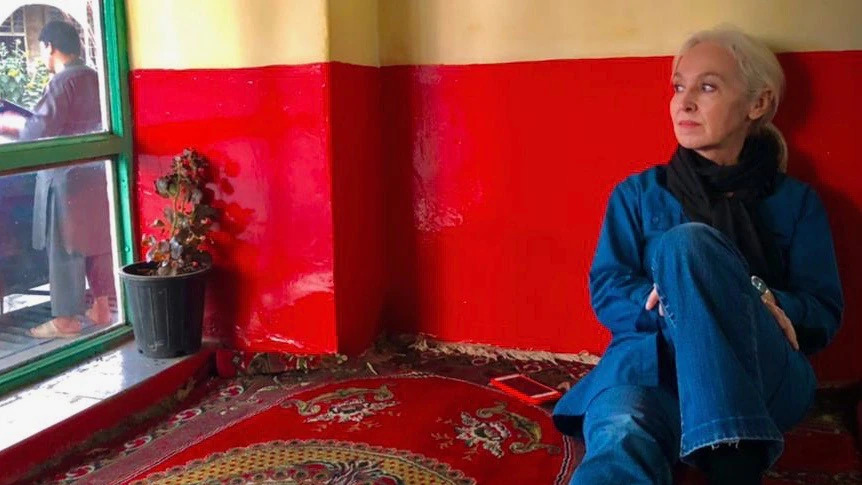Lynne O’Donnell, a columnist at Foreign Policy and an Australian journalist and author, returns to Kabul, almost one year after the United States left Afghanistan.
“I left Afghanistan after three days of cat-and-mouse with Taliban intelligence agents, who detained, abused, and threatened me.”

Lynne O’Donnell, an Australian columnist for Foreign Policy magazine, alleges that she was detained, abused and forced to post a series of tweets stating her articles were false.
She has since left Afghanistan. The Taliban confirmed they had detained Ms O’Donnell and claimed she had falsified reports.
“I left Afghanistan after three days of cat-and-mouse with Taliban intelligence agents, who detained, abused, and threatened me and forced me to issue a barely literate retraction of reports they said had broken their laws and offended Afghan culture,” she wrote in a Foreign Policy article about her experience.
Here is what she went through during her stay in Afganistan:
I returned to Afghanistan this week, almost one year after the withdrawal of the U.S. military cleared the way for the Taliban’s victory. I wanted to see for myself what had become of the country since I flew out of Kabul on Aug. 15, 2021, hours before the Islamists began what many residents now refer to as a “reign of terror.”
I was in the north of Afghanistan when the United States invaded in the wake of the 9/11 terrorist attacks and in Kabul when the Taliban returned 20 years later. In between, I spent many years as a resident correspondent.
I left Afghanistan today after three days of cat-and-mouse with Taliban intelligence agents, who detained, abused, and threatened me and forced me to issue a barely literate retraction of reports they said had broken their laws and offended Afghan culture. If I did not, they said, they’d send me to jail. At one point, they surrounded me and demanded I accompany them to prison. Throughout, a man with a gun was never far away.
Far from achieving their goal of intimidating and undermining me, they showed me what I went to find—their true face. Their brutality, arrogance, and lack of humanity. Their self-righteousness, intolerance, and misogyny. Their incompetence and their utter lack of ability to rule. Afghanistan has fallen prey to terrorists who have not and cannot make the transition from fighting force to governing body.
Everywhere I went in the short time I was in Kabul, people told me of their fear, their loss, their disgust, their desperation. Most have no jobs, no money, no hope for their future or the future of their children. What I found was a violent peace. People are arbitrarily detained, disappeared, interrogated, beaten, killed. It could be for any reason or no reason they will ever know. The Taliban are pitting neighbor against neighbor, encouraging people to spy on and report each other. Fear is digging in, and it’s here for the long haul.
The men in charge are violent men, proud of their violence. Foreign ministry spokesperson Abdul Qahar Balkhi, who spent years living in New Zealand, called me a “white supremacist colonialist” and threatened me with violence by reminding me of a 2016 Taliban attack on a local television station after it carried a false report and refused to retract it. “We are proud of that,” Balkhi said. I told him that innocent people had been killed in the suicide attack on a bus taking employees home. “And we are proud of that,” he said. I told him a friend of mine was among the dead. “And we are proud of that,” he repeated.
I was told that articles I had written for Foreign Policy were fantasies, lies, concocted, and that my sources did not exist. And if the stories were true and the sources did exist, I was ordered to hand over all their names and details, as well as notes, photos, voice recordings, and video.
“There are no gays in Afghanistan,” I was told by one of the intelligence agents who came for me, who refused to tell me his name. His fellow agent, Ahmad Zaheel, told me that if he learned anyone was gay, “I will kill them.” The terrorists and extremists took umbrage at being referred to as terrorists and extremists.
“What is extremist?” I was asked. “You say there are no gays in Afghanistan—that seems to be quite an extremist point of view,” I countered.
When I asked what laws I’d broken, they told me, in a mix of Orwell and Kafka, “You know.” They’d look at each other, narrow their eyes, jut their chins, and say, “She knows.”
You can read her full article here.
Source: Foreign Policy

